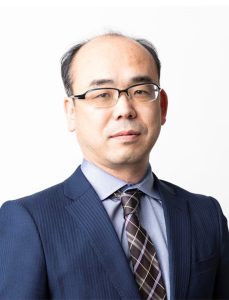Professor Koji Fukui,
Laboratory of Molecular & Cellular Biology, Department of Life Science, Faculty of Science and Technology, Shibaura Institute of Technology

Part II delves deeper into Professor Fukui’s encounter with the supplement “Twendee X,” why he was impressed, detailed findings from his research, fortuitous discoveries in the lab, and future directions in dementia research—revealing the wellspring of his unending scientific curiosity.
― Professor, what prompted you to begin research on the antioxidant supplement “Twendee X”?
Professor Fukui: My introduction to Twendee X came via Dr. Toshikazu Yoshikawa, Honorary Chairman of the Japanese Society for Oxidative Stress Research and a leading expert in the field. Professor Yoshikawa was a towering figure to me as a student—someone I’d never even spoken to. He knew our lab’s behavioral analysis systems well and introduced me to Dr. Haruhiko Inubo at Gifu University.
Among many materials, what intrigued me most was Twendee X’s “mix supplement” concept. While some dismiss supplements as ineffective, Twendee X already had robust human scientific evidence before I begun my research.
Also, even if people take multiple supplements, they rarely know which, how much, or when to take them. In contrast, Twendee X’s formula contains eight components chosen by Dr. Inubo at optimal dosages—completely thought out. That impressed me deeply.
When I first saw its ingredient list, I instinctively thought, “This could work!” It includes not only B vitamins, vitamin C, and CoQ10, but also amino acids. I had been investigating amino acids alongside vitamins for oxidative stress mitigation, so it was fascinating. Having spent years studying vitamin E, I felt compelled to test Twendee X in my own evaluation systems.
When we actually tested it on mice, the results were astonishing. Despite not containing any fat-soluble vitamins (my area of expertise), Twendee X markedly improved cognitive function in mice.
Moreover, our model was not genetically engineered mice but normal aging mice or those made obese by a high-fat diet. For a natural model treated with natural-derived ingredients to show such dramatic effects is truly rare. That’s why I was genuinely amazed—natural ingredients yielding such outcomes is remarkable.
― Have you ever encountered unexpected discoveries during your research?
Professor Fukui: Absolutely. Working with vitamin E, I once observed that certain mice had become unexpectedly lean after administration. Subcutaneous fat decreased. When repeated, the result was consistent—completely unexpected.
To catch such serendipitous findings, I emphasize communication with students. They run the experiments, so creating an environment where they feel free to report minor anomalies is crucial.
Then, if someone says, “Professor, this result was weird…”, I can respond, “Hmm, that could be interesting—let’s explore further.” If the lab atmosphere were tense, with no room for such discussion, those chances for discovery would be lost.
I always tell my students: “Examine raw data thoroughly from every angle.” Staring at data closely, you might uncover something Nobel-worthy. Don’t dismiss results with “no change”—observe meticulously.
My students are partners in research. I rarely scold them. Our shared goal is efficient, high-impact discoveries. We discuss time management, experiment design, critical thinking together to achieve that.
Launching experiments without forethought is inefficient. Instead, I recommend eliminating unlikely options beforehand, identifying a robust hypothesis branch, and then designing experiments around that core. That’s my style.
Importantly, I let students choose their research topics. When they pursue a topic they care about, motivation stays high—and that often leads to great outcomes.
― Dementia prevention is a hot topic today. How do you envision future research in this field?
Professor Fukui: Awareness around dementia has drastically evolved in recent decades. What was once “oh they just got older” is now met with terms like “pre‑dementia.” Preventive efforts—scientifically based—like supplements, light exercise, and frailty prevention are becoming mainstream. Society as a whole has entered a stage of evidence-based dementia prevention.
At the recent Japanese Geriatrics Society meeting, I heard that rising prevention awareness might slow the expected rapid increase in dementia cases. They’re even considering revising projection models. Despite this, the overall trend of increasing patient numbers will likely continue.
One hot topic in aging research is “senolytics”—drugs that remove senescent, inflammation-inducing cells. It’s actively discussed at conferences. Of course some senior researchers ask, “If I took that drug, would all my cells die?” (laughs). While promising, I believe senolytics are not a cure-all.
My personal focus is on calorie restriction. Longevity studies across species—from nematodes to primates—show lifespan extension with caloric limitation. This may relate to reduced metabolic activity, lower oxygen consumption, and decreased oxidative stress.
That prompted me to study the opposite—what happens if excess calories are consumed? Does obesity accelerate aging? Impressed by U.S. research on calorie restriction, I returned to Japan and began research using obese mice. The finding that antioxidant vitamins also induced weight loss stemmed from that line of inquiry.
There’s a saying that moderately overweight people might live longer and debate around whether low-carb diets truly benefit health—these topics fascinate me. While senescent cell research is vital, I intend to continue deeply exploring connections between diet and aging.
From dramatic effects of Twendee X to boundless curiosity about calorie restriction, Professor Fukui’s passion for science shines through. His mantra—“examine raw data as if savoring every detail”—reflects a researcher’s genuine dedication to data-driven discovery.
While grounded in basic research, he never loses sight of real-world application, envisioning a future where people from diverse environments can personally experience benefits. His unwavering pursuit in foundational science inspires hope for futures where health and longevity go hand in hand.

Laboratory of Molecular & Cellular Biology, Department of Life Science,
Faculty of Science and Technology, Shibaura Institute of Technology
307 Fukasaku, Minuma-ku, Saitama 337-8570, Japan
https://sit-mcblab.sakura.ne.jp
[Collaborative research publications]
“A Blended Vitamin Supplement Improves Spatial Cognitive and Short‑Term Memory in Aged Mice.”
“A mixed antioxidant supplement improves cognitive function, and coordination in aged mice.”